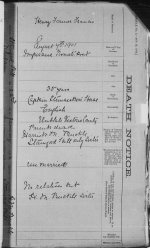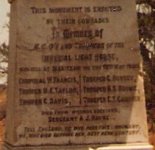Taphrospilus
Well-known member
OD of Erythrocercus livingstonei francisi here.
I just want give the name for discussion as I have no clue if The Eponym Dictionary of Birds is correct with:
But it seem plausible from here
I tend to attribute the name to H. F. Francis as he provided field notes to Sclater's article.
At least one of them H. F. Francis is mentioned in here several times with no additional names. He was part of the so called
p. 29
p. 30-31
p. 35
So one of his names may Farmer supported by here. I would go one step futher as according here Henry Farmer Francis.
As the topic is very historical I assume it should be possible to get the names. And the King’s South African medal may help also to identify him.
I just want give the name for discussion as I have no clue if The Eponym Dictionary of Birds is correct with:
Capt. H. F. Francis (d.1901) and his brother W. F. Francis (d.1900) were British explorers and collectors in Mozambique (1898); both served and were killed in the Boer War. Sclater's brief original description does not specify which brother is being honoured in the bird's name.
But it seem plausible from here
H . F . and W . Francis , and presented by them to the Museum.
I tend to attribute the name to H. F. Francis as he provided field notes to Sclater's article.
At least one of them H. F. Francis is mentioned in here several times with no additional names. He was part of the so called
(Francis Christiaan Ludwig von Steinaecker).Steinaecker’s Horse
p. 29
During this confrontation the officer in charge of the fort, Captain HF Francis, and many of the Shangane troops,
p. 30-31
British archival records indicate that 337 members of Steinaecker’s Horse received special mention after the war. Of these 327 qualified for the King’s South African medal (BNA, WO 100/365). Eight members of the unit were specifically mentioned by Lord Kitchener (NAD, TAD, FK 1911, 1902). These are troopers DE Wilson and F Hennessey on 8 March 1902, Lieutenant WP Robertson and trooper WW Griffin on 1 June 1902 and captains HF Francis, AD Greenhill-Gardyne and lieutenants JM Dallamore and D Buchanan on 23 June 1902 (Woolmore 2006: 336).
p. 35
It was placed under command of Captain HF (Farmer) Francis. The garrison consisted of 30 men,4 but the local followers of Chief Mpisane were also armed (Pienaar 1990: 348). During the battle Captain Francis was killed and he was buried next to the fort.
So one of his names may Farmer supported by here. I would go one step futher as according here Henry Farmer Francis.
As the topic is very historical I assume it should be possible to get the names. And the King’s South African medal may help also to identify him.
Last edited:







